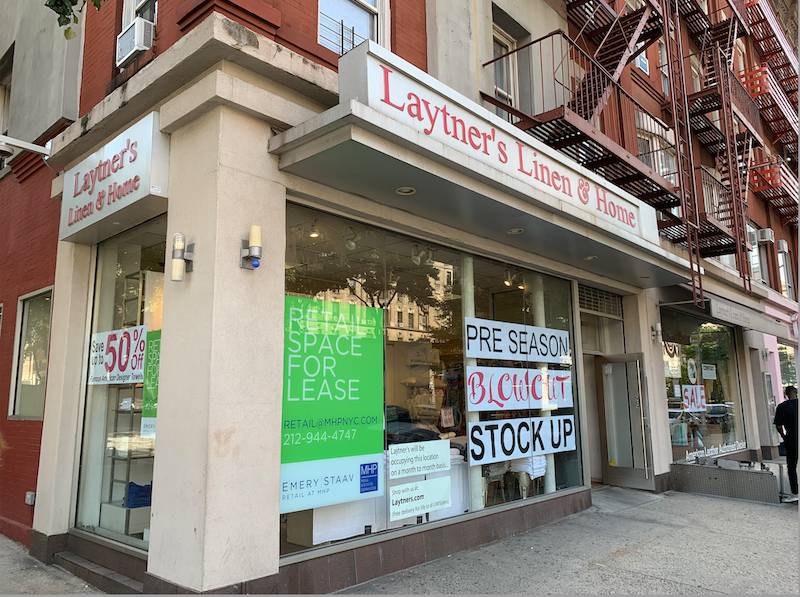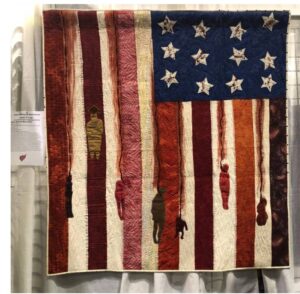“Too much change,” Patrick sighs in a chopped, Cantonese accent. His tired eyes look down. His head shakes slowly from side to side. “Bad, bad. Too much change.” He doesn’t seem to want to look up out of fear that the reality of his situation will be even clearer still.
Patrick might as well have been speaking for any of his fellow mourners that recent morning – for other employees and loyal customers in particular – at the imminent demise of what is likely to be his final place of employment: Laytner’s Linens, a decades old retail establishment, still housed on New York’s Upper West Side and Upper East Side. Like many other small businesses started by immigrants after the turn of the 20th century, Laytner’s will soon shutter, another victim of on-line shopping, big box stores, and rising commercial rents.
Laytner’s was opened 1961 in New York City, in many ways as the third offspring and “baby of the family” of Helen and Joseph Laynter, Holocaust survivors who met at the Liberation of Paris in August 1944. The Laytners emigrated to the United States several years later, having learned the whereabouts of one of Helen’s other surviving family members through classified ads in local New York dailies. The couple settled on the Upper West Side, at 83rd Street between Amsterdam Avenue and Broadway, a neighborhood often called the “schtetl” of Manhattan for its predominantly Jewish, working class residents, many of whom had fled Europe out of fear of Nazi persecution.
Helen and Joseph initially took jobs wherever they could find them, to pay the rent, to buy food and, by the mid-50’s to support a family. Their first son, Mel, arrived in 1954. Alan, followed 1957.
Mr. and Mrs.’s final co-production, as it were, came four years later when they took over a 40’ by 12’ candy store from the retiring Klein brothers at the corner of Broadway and 81st Street. Typical of Joseph’s no nonsense style, they renamed it “Laytner’s” because that is what it was: no less a member of the family, and if not the apple of their eye, than without doubt, according to Alan Laytner, the subject of almost all of their attention.
Laytner’s expanded upon the Kleins’ business model, adding various daily sundries like newspapers, magazines, comics and tobacco, making it a necessary stop in many a West Sider’s day. Egg creams, milkshakes and a simple soda shop food menu featuring grilled cheese sandwiches and burgers were also available from seven rotating stools at the back. Early rent payments were met from a portion of the monthly $68 restitution payment Helen received from the German government. But soon enough, Laytner’s had a following and associated sales – regulars like up-and-coming actor Walter Mathau (born Walter John Matthow) and Nancy Walker (nee Anna Myrtle Swoyer) were among many who would grab a quick but delicious bite at the counter before or after work. Two wooden phone booths, with folding glass panel doors, and an oversized ice bucket for the daily ice delivery, were tucked away beyond.
Alan Laynter recalls many afternoons at his namesake’s, hiding out under the counter top after school, wedged between stools, while poring over the most recent issue of Archie and Veronica. His mother manned the till up front – “it was really just a can with money and slips of paper receipts” Alan says – while his dad cooked, stocked, and restocked toward the back. They never took a break. When the comic supply for the week was exhausted, Alan counted the number of pieces of prechewed gum that customers had stuck underneath the counter until it was time to go home to do homework. The large stock of candy was a plus too: “like a dream come true,” Alan remembers. “No wonder I had three root canals by the time I was 12.”
The mid-60’s brought a wave of urban development south of Laytner’s and with it, a shift in demographics and customer traffic. Crime rates rose and drug trafficking spiked. “There was a lot of heroin, a lot of guns,” Alan recalls. Cash businesses like Laytner’s were an easy target. Cigarettes were also on the hit list for their easy resale value. Local punks would hang out on nearby sidewalks, swinging by Laytner’s just long enough to flip the well stacked dailies and flee. After suffering a series of break ins – the last one of which resulted in the loss of $300 worth of cigarettes – and the associated stress and toll on their health, Mr. and Mrs. decided it was time for a change.
Led in large part by Helen and a connection she had made at an upstate tuberculosis sanatorium – “forever the opportunist” her son Alan says – the Laytners partnered with David and Sydney Pitter, jobbers in the textile trade. Alan remembers Sydney Pitter as “a real gentleman” and especially generous when it came to finances. “He extended credit to Laytner’s at a time when we had no assets. He said he knew we would pay him back,” Alan says, smiling wistfully at the memory.
Laytner’s original home was quickly dismantled: no more soda counter, phone booths, or ice bucket. A new, longer display counter was repurposed from a nearby dry cleaner that had closed. A few tables were stacked along the walls for display shelves. And without missing a possible sales day, the Monday after the Six Day War, in 1967, Laytner’s was officially reborn as “Laytner’s Linens”, home textiles for the area’s cost-conscious housewives. The new Laytner’s promised high-quality, well-priced sheets and towels in a variety of materials and colors, the basics with a few upscale choices – a different kind of candy to the neighborhood housewives. As before, Laytner’s real draw was service and efficiency with a heavy dose of family. And Helen, when she chose to, had a way with the ladies. Alan says she was an old time schmoozer who could crank it up as needed, flattering the largely female following into buying more and buying up, and celebrating their good taste with every purchase they made. The ladies of the Upper West Side ate it up.
Sales tripled within the first 10 years and thanks to such largesse, Laytner’s Linens grew in size, doubling its footprint on the west side. Ever the pragmatists, Helen and Joseph continued to keep costs low. No high priced renovations. No unnecessary décor. The array of product was decoration enough. The only change: a doorway cut into the wall of the adjoining space. The lone front door remained untouched. More of the same items were piled onto to make shift shelving – a bigger selection of sheets and towels – plus the addition of other home goods like
dish towels and floor mats. Seasonal decorations were added as well, lending a brief bit of sparkle to an otherwise utilitarian layout.
By the time Joseph died in 1984, Laytner’s was a truly professional operation, with dozens of employees, tight inventory controls, sales systems, and up-to-date registers in lieu of the old coffee cans with paper scraps for receipts that Helen and Joseph had relied on for years (Alan
recalls that his father could pick up the can at the end of the day and with a few shakes, estimate within cents the daily proceeds). The family name had become a go-to shopping hub in seven neighborhoods in and around New York City: a new location on the eastside of Broadway at 83rd Street; Lenox Hill on the east side; Yorkville, on the Upper East Side; Forest Hills, Queens; Park Slope; lower Broadway; and lastly, Westchester County. Alan Laytner remembers the day soon before his father’s death when he told him they had grossed over one million dollars the previous year. “I don’t think he really believed me,” he said fondly, so inconceivable was such a milestone for a penniless orphan of the Holocaust.
The decline in Laytner’s Linens health came on slowly. Rent hikes began to nibble away at margins, forcing then President Alan to relocate or to give up some of their storefronts. Their most loyal customers moved on to nursing homes or died nearby with fewer stay-at-home parents to replace them. Alan Laytner says he did his best to keep operations going despite the crippling effects. He offset sales declines with income from a separate real estate investment. He launched a private label textile firm that sold only to the trade. He says his current landlords were accommodating as they could be without lowering the rent. In both the east and west side stores, month-to-month contracts were negotiated until permanent tenants could be found. But Alan’s savvy and good intentions – not to mention his intense fealty to his employees’ welfare – was no match for the deadliest threat to local retailers in town: Amazon. For that, there was no easy cure.
Business journals will remember Laynter’s Linens for its no-nonsense, good value approach to retail. The efficiency of its operations. The quality of its goods. But employees, neighbors and frequent shoppers will forever cherish the store – and the family – for the intangibles they left behind – the values they modeled daily that spoke of their fairness, trust-worthiness, and kindness to all. Bradley, a long-time employee on the east side, says that Alan has always been a remarkable boss. Family time, health issues, parent-teacher conferences – whatever the personal issue, they all took rightful precedence for employees thanks to the flexibility and inherent humanity of the company’s workplace philosophy. Service was never for shoppers alone.
As for the customers themselves, the time of mourning has already begun. Witness the scene one recent morning in the west side location, when one of the remaining faithful supporters walked in the doors only to learn that the they would finally be locked by the new year. She wobbled a bit and then wailed. “No! That is just unacceptable!” The emptying shelves and Patrick’s doleful head shakes say otherwise.



